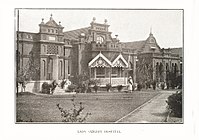This article needs additional citations for verification .(September 2018) |
Bowring and Lady Curzon Hospitals (BLCH) is a teaching hospital and autonomous university in Bengaluru, Karnataka, India. It was originally a medical institution belonging to Mysore State, but in 1884 it was made over to the Civil and Military Administration. This hospital was only the Civil Medical Institution of Bengaluru till 1890. It had accommodation for 104 beds, of which 80 were for men and 24 for women patients. Additional accommodation for female patients was provided by the donations contributed by philanthropic citizens and by the Government of India. Sri Atal Bihari Vajpayee Medical College and Research Institute inaugurated on 29 December 2020 is located close by.
Contents
Located in Shivajinagar in the city's central business district, the 152-year-old hospital has also taught students pursuing medical degrees since the late 19th century during the British Raj.
